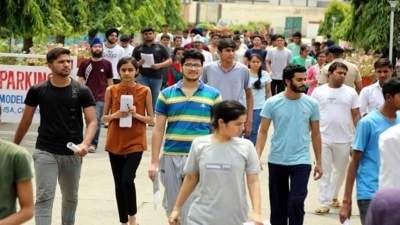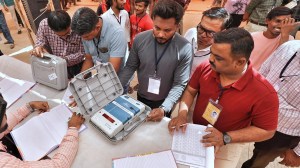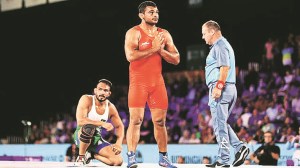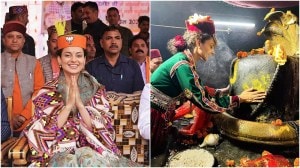- India
- International
Gujarat custody death case: Jamnagar court relied on medical records, circumstantial evidence to convict Sanjiv Bhatt
The court of sessions judge DM Vyas on Thursday pronounced Bhatt and then constable Pravinsinh Zala guilty of murdering Prabhudas Vaishnani, voluntarily causing hurt and threatening others, and sentenced them to life imprisonment.
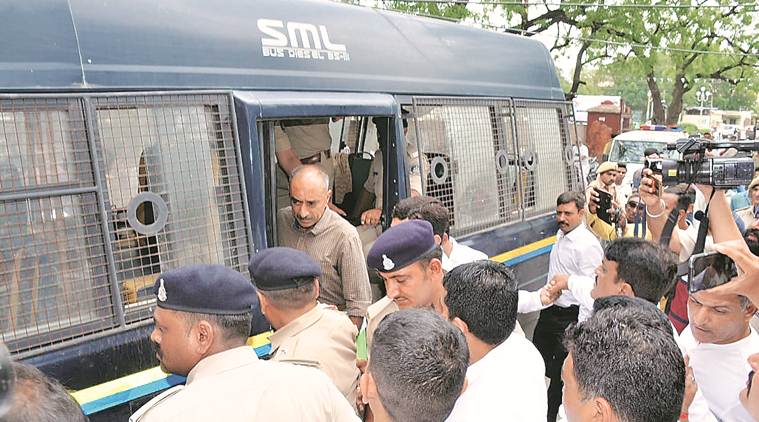 Sanjiv Bhatt at the Jamnagar court, Thursday. (Express photo by Rakesh Chudasama)
Sanjiv Bhatt at the Jamnagar court, Thursday. (Express photo by Rakesh Chudasama)
The Jamnagar sessions court relied on medical records and oral deposition of witnesses, apart from circumstantial evidence, to convict sacked IPS officer Sanjiv Bhatt and six other policemen in the Jamjodhpur custodial death case, even as the defence argued that there was no material evidence against the accused.
The court of sessions judge DM Vyas on Thursday pronounced Bhatt and then constable Pravinsinh Zala guilty of murdering Prabhudas Vaishnani, voluntarily causing hurt and threatening others, and sentenced them to life imprisonment. The court also convicted police sub-inspectors Dipak Shah and Shailesh Pandya and constables Pravinsinh Jadeja, Anopsinh Jethva and Kesubha Jadeja of custodial torture and criminal intimidation and sentenced them to two years of imprisonment.
The case dates back to October 30, 1990 when Bhatt, then posted as additional superintendent of police of Jamnagar district and other police officers arrested 133 persons from Jamjodhpur town of Jamnagar district for allegedly indulging in rioting during a nationwide bandh call given by the Bharatiya Janata Party and the Vishwa Hindu Parishad to protest against BJP president LK Advani’s arrest during his rath yatra to Ayodhya.
Prabhudas (40) and his youngest brother Rameshchandra were among the 133 people arrested and booked under the Terrorism and Disruptive Activities (Prevention) Act. They were sent to Jamnagar jail the following day after being remanded in judicial custody and released on bail on November 8, 1990.
However, Pradbhudas and his brother, who was also among the accused, fell ill and were taken to hospital by another brother Amrutlal. After doctors in Jamnagar informed Amrutlal that his brothers had renal problems, he took them to NM Virani Hospital, where Prabhudas died on November 18, 1990. Doctors said he had died due to acute renal failure and cardio-respiratory arrest.

Read | 1990 custodial death case: Justice and god were on our side, says brother of ‘police torture victim’
Following Prabhudas’ death, Amrutlal, who was then Jamjodhpur convenor of VHP, filed an application seeking a direction from the then sub-divisional magistrate of Jamnagar to the authorities to conduct a post-mortem examination of Prabhudas’s body, stating that his brother had died due to custodial torture by Bhatt, Zala and other policemen. The autopsy conducted at the state government-run Erwin Hospital in Jamnagar confirmed the cause of death mentioned by the Rajkot doctors.
Amrutlal’s application for autopsy was then treated as a complaint and Bhatt and other policemen booked under IPC Sections 302 (murder), 323 (custodial torture) 506 (1) (criminal intimidation) etc. The probe was subsequently handed over to the CID (crime) even as the TADA case against the 133 residents of Jamjodhpur was withdrawn by the state government.
One of the defence arguments was that just because the accused were police officers and employees, they should not be subjected to “moral conviction”. The counsel added that at no point during Prabhudas’ treatment had Amrutlal revealed to doctors that his brothers had been beaten up by police. However, the court agreed with Amrutlal’s submission that he did not inform doctors of the police torture, worried they may refuse to treat his brothers, given the atmosphere of fear all around and a curfew having been in place. “The behaviour of the witness…is natural as, in such circumstances, the priority of a prudent person would be to ensure that his brothers get medical treatment immediately,” the court observed.
During the trial, the defence lawyers argued that prosecution had failed to produce the weapons used to commit the alleged murder and custodial torture. The judgment records the defence lawyer as having submitted: “In the absence of muddamaal (material related to a crime), the allegations that the accused had used weapons to cause injury is not proven.”
The court, however, took on record papers of the medical treatment of Prabhudas and also concurred with the opinion of Dr Sanjay Pandya, a Rajkot-based urologist who treated Prabhudas and his brother Rameshchandra, that the kidney of a person can be damaged due to physical exertion such as repeated rounds of sit-ups and crawling. This was backed up by Rameshchandra’s testimony that Bhatt and other policemen had forced him and Pradbhudas to do sit-ups till they collapsed and then made them crawl.
The prosecution also submitted official records to establish that Bhatt and other police officers were present in Jamjodhpur on the day of the crime and that the victims had been in their custody. In all, the prosecution examined 32 witnesses.
Judge Vyas concluded that the oral submissions and documents on record proved a case against the accused. “Appreciating oral submissions and documentary evidence on record and referring to principles established by verdicts of honourable Supreme Court and honourable high courts, it is proven beyond doubt in this case that Prabhudas Madhavji Vaishnani’s death was a culpable homicide.” the court concluded.
Apr 18: Latest News
- 01
- 02
- 03
- 04
- 05











